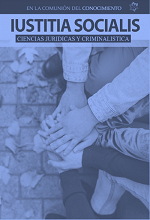Labour projections for domestic workers in the context of COVID-19
DOI:
https://doi.org/10.35381/racji.v5i3.1119Keywords:
Right to work, pandemic, employment of women.Abstract
Given the importance of the issue related to the reality of the pandemic, the following work is presented whose main objective of this research is to analyze the labor projections for domestic workers in the context of COVID-19, in Ecuador and the violation of their work. The research was developed from a quantitative perspective, documentary type, the design is limited to the bibliographic. This design uses logical and mental procedures such as: analysis, synthesis, deduction and induction, through an analysis of the content of regulations, laws, reports, data from world organizations, related to the subject of study. It is concluded that there is a need to propose alternatives in order to protect and protect the rights of domestic workers, since the reality that will come after the pandemic will surely be even more complicated, for this reason, this sector of society must count with the necessary guarantees to continue with the provision of its services.
Downloads
References
Asamblea Nacional Constituyente de la República del Ecuador, (2008). Constitución de la República del Ecuador. Montecristi. Registro Oficial 449 de 20-oct-2008. Recuperado de https://n9.cl/sia
Caamaño-Rojo, E. (2010). Mujer y trabajo: origen y ocaso del modelo del padre proveedor y la madre cuidadora. [Woman and Work: Source and Decline of the Provider Father and the Caregiving Mother Model]. Revista de Derecho de la Pontificia Universidad Católica de Valparaíso, 6,179-209. http://dx.doi.org/10.4067/S0718-68512010000100005
Consejo Nacional para la Igualdad de Género (2020). Los riesgos a los que se enfrentan las mujeres durante la amenaza sanitaria por el COVID-19 en Ecuador. [The risks women face during coVID-19 health threat in Ecuador]. Recuperado de: https://n9.cl/v0ajl
Lexartza, L., Chaves, María José & Carcedo, A. /2016). Políticas de formalización del trabajo doméstico remunerado en América Latina y el Caribe. [ Policies for the formalization of paid domestic work in Latin America and the Caribbean.] Lima, OIT, Oficina Regional para América Latina y el Caribe, FORLAC, 52 p. Recuperado de: https://n9.cl/e88nn
Naciones Unidas (2020). Plan de Respuesta humanitaria COVID-19 Ecuador. [COVID-19 Ecuador Humanitarian Response Plan]. Recuperado de: https://n9.cl/m7ak
OIT (2009): Trabajo decente para los trabajadores domésticos, Informe IV (1), Conferencia Internacional de Trabajo, 99.a reunión, 2010.
Organización Internacional del Trabajo (2020). El trabajo del hogar en tiempos de COVID-19. [Home work in COVID-19 times]. Recuperado de: https://n9.cl/3w9va
ONU Mujeres-OIT-CEPAL (2020). Trabajadoras remuneradas del hogar en América Latina y el Caribe frente a la Crisis del COVID-19. [Paid domestic workers in Latin America and the Caribbean in the face of the COVID-19 Crisis]. Recuperado de: https://n9.cl/5o26u
Palella Stracuzzi, S. & Martins Pestana, F. (2012). Metodología de la investigación cuantitativa. [Quantitative research methodology]. Fondo editorial de la Universidad Pedagógica Libertador. Caracas, Venezuela.
Sánchez, Jorge E., José Luis Sánchez-Espinosa, José L., Jorge Hernando Sánchez-Espinosa, Jorge H, & Sánchez-Espinosa, V. (2019). La igualdad de la mujer y el derecho al trabajo en Ecuador. [Women's equality and the right to work in Ecuador]. KOINONIA. 6(8), 39-63. http://dx.doi.org/10.35381/racji.v4i7.354
Published
How to Cite
Issue
Section
License
CC BY-NC-SA : Esta licencia permite a los reutilizadores distribuir, remezclar, adaptar y construir sobre el material en cualquier medio o formato solo con fines no comerciales, y solo siempre y cuando se dé la atribución al creador. Si remezcla, adapta o construye sobre el material, debe licenciar el material modificado bajo términos idénticos.
OAI-PMH URL: https://fundacionkoinonia.com.ve/ojs/index.php/Iustitia_Socialis/oai










